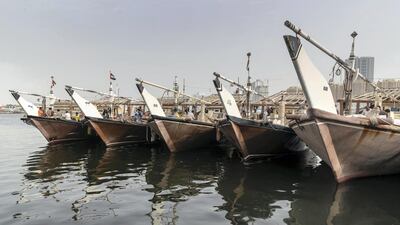The seasonal fishing ban on Arabian safi, sheri and all shark species comes into effect March 1.
The annual ban protects safi and sheri, also called emperor fish and rabbit fish, during the two-month spawning season.
Any trade in the fish species, regardless of country of origin, is also banned until April 30. This extends to the import and export of the fish in any form, whether fresh, frozen, salted, smoked or packed.
The ban on shark fishing, introduced in 2019, will be in effect until June 30.
“Regulating the fishing sector is crucial to its long-term sustainability,” said a statement from Halima Al Jasmi, the head of the fisheries at the Ministry of Climate Change and Environment. “The two decisions align with the Ministry’s strategic goal of enhancing food diversity, as they help sustain the population of these species through giving them time to reproduce.”
Safi and sheri populations have increased five years after the introduction of the federal ban, the government announced last week. A national study found safi and sheri catches rose by 30 and 17 per cent, and the average
size of the fish caught had increased.
Additional measures, such as the Abu Dhabi ban on gargoor traps, have been introduced in a push to restore fish stocks to 30 per cent by 2030.
Overfishing and habitat degradation have decimated shark and fish species.
A four-year action plan to save sharks was released by the Ministry of Climate Change and Environment in 2019. Just over half of the 153 sharks, rays and sawfish species in the Arabian Sea region are considered threatened.
There is a permanent ban on fishing shark species listed in the Convention on International Trade in Endangered Species of Wild Fauna and Flora.
The import and re-export of shark fins in any form is illegal.
Sharks play an important ecological role and prevent the spread of disease by scavenging on the sea floor and eating old, sick and slower fish.

